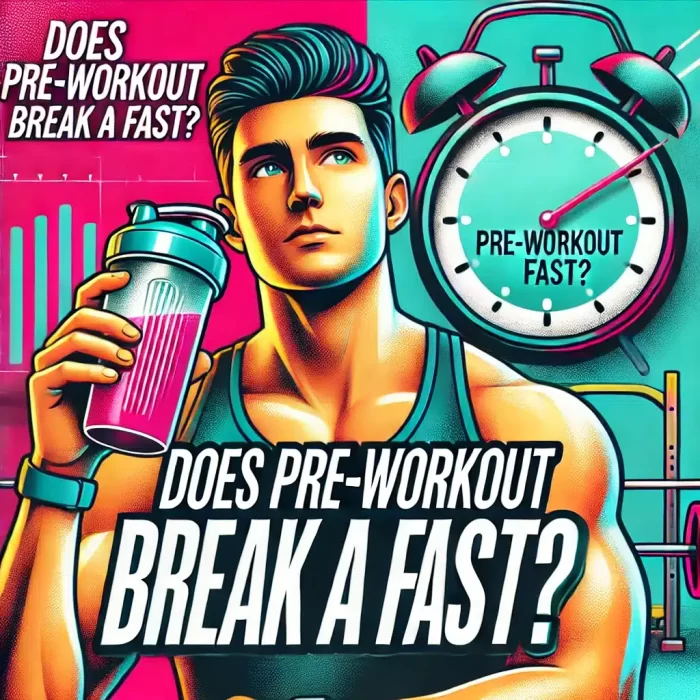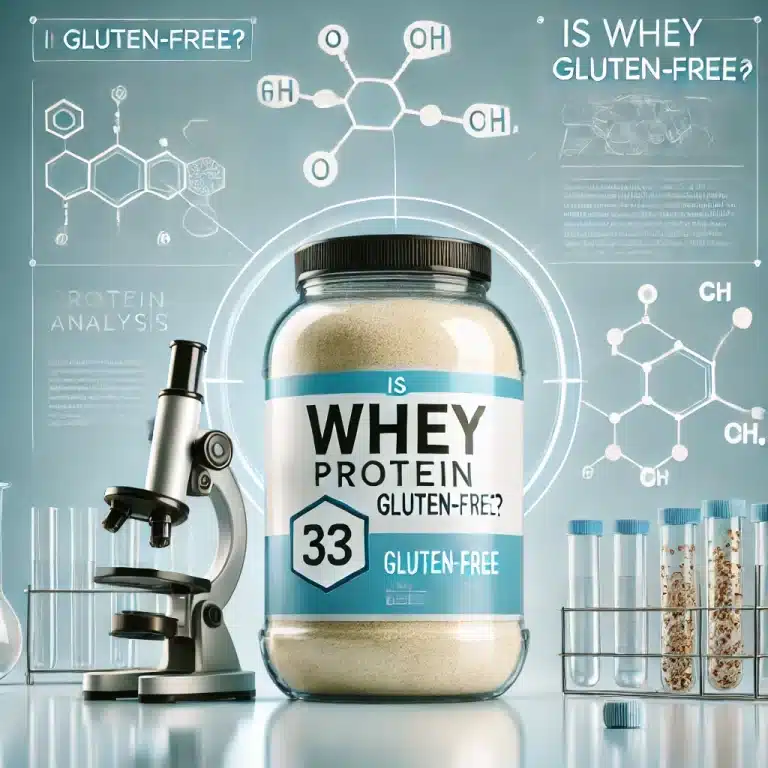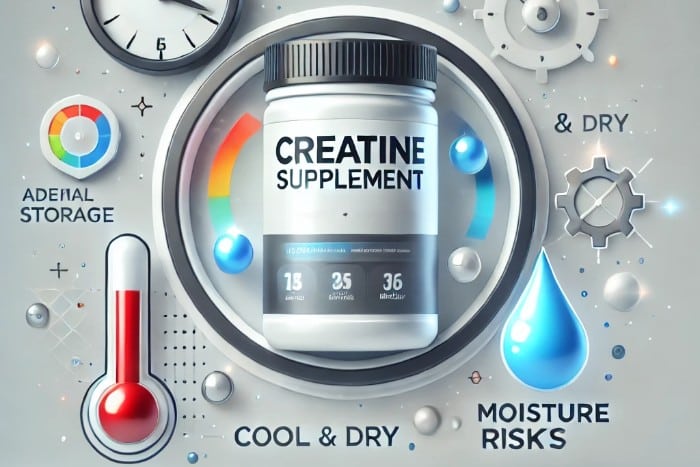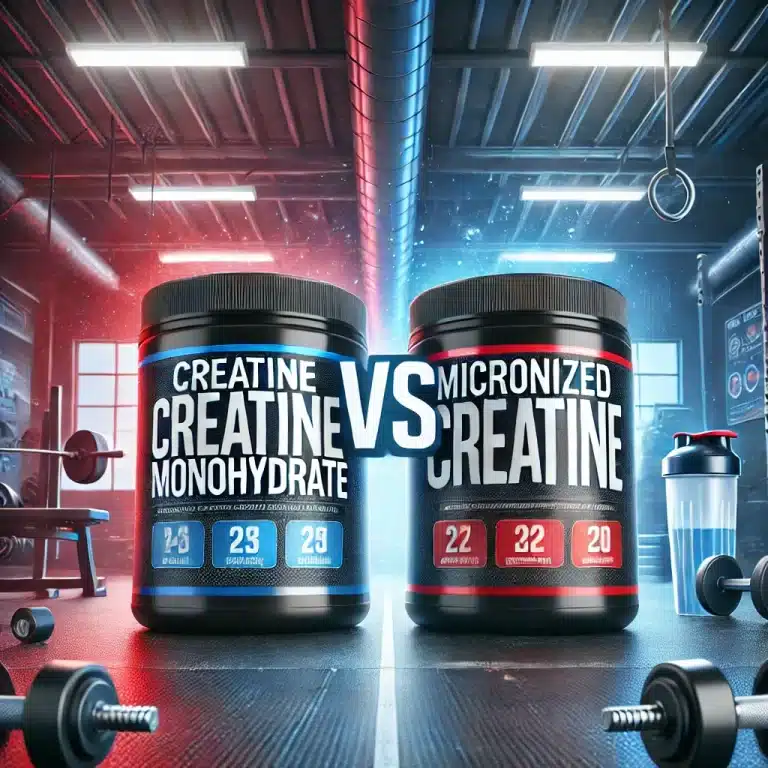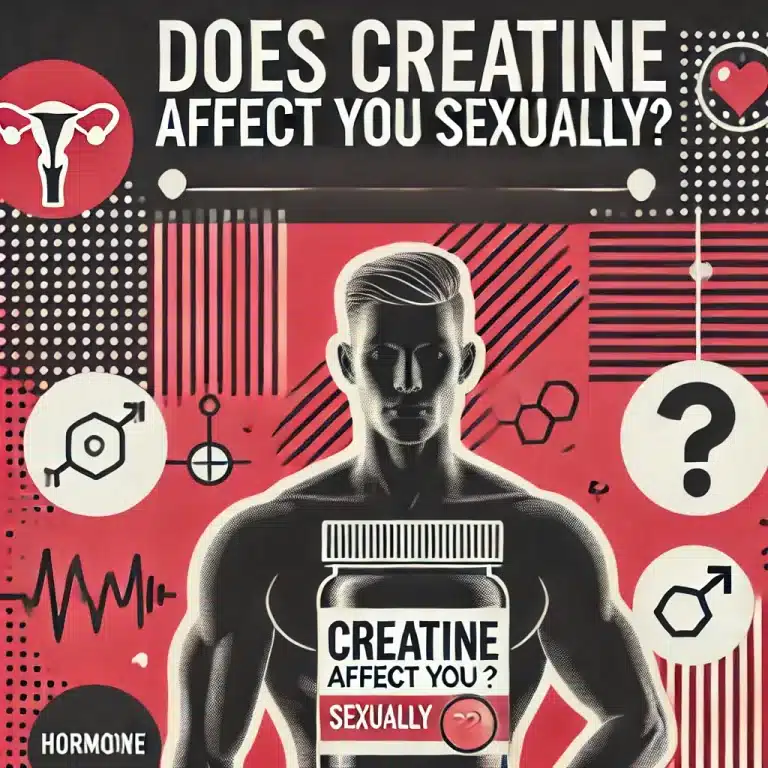Does Pre-Workout Break A Fast?
Remember when, decades back, doctors warned us about the dangers of fasting, how unnatural it was, how it could lead to weight gain and do more harm than good?
If so, you’re probably aware also that many of those claims have been debunked, and are simply not true. Well, Fasting has gained popularity among doctors, celebs, athletes and fitness trainers and for good cause. Fasting has a plethora of health benefits, and it’s surprisingly easy to do.
Of the many different fasting protocols to undertake, arguably the most prevalent is intermittent fasting — also referred to as IF. With this approach, you fast for a number of hours before allowing yourself to refeed for a specific time period. The most common approach is 16:8, which involves 16 hours of fasting followed by an 8-hour feeding window.
You should drink enough fluid, but you can’t eat during a fast. When fasting, few may prefer to train and might require some additional kick while training. This is where a pre-workout can be effective. So really, does pre-workout break a fast?
Well, that’s what we’re about to discover below.
How Do You Break a Fast?
So to start today, we’re actually going to look at what it means to BREAK the fast that you’ve been doing, health-wise, and weight loss-wise — not religiously or just everyday-wise. We break our fast with every first meal of the day (i.E. breakfast). The meal itself is called break-fast because you are breaking a fast when you eat; as you will have gone several hours without food (as you slept).
Intermittent fasting was at one point demonized, when now health experts, personal trainers, doctors, nutritionists, bodybuilders, athletes, and all the people in the know (the kind of people who know what to do with clay pots) encourage it. If fasting is controlled it is supposed to provide numerous health benefits to the body.
The human body can benefit from both short-term and long-term fasting. Fasting for short periods of time, under 24 hours, has been associated with increased insulin sensitivity and reduction in inflammation.
Short-term has had great success for certain cellular repairs, energy production, sustainable weight loss, immune system enhancement, et al. That’s all well and good, but what does it really mean to break a fast?
For instance, will consuming a drink break a fast?
No, not at all, at least not if it’s not something that has added, or any kind of sugar, or ingredients that would cause insulin spike and/or kick off a number of metabolic pathways in the body, then no. An extremely important aspect of fasting is ensuring that you drink enough water and are well hydrated. There’s a great deal of science behind this but I can’t cover it all, so in short, if you follow any fasting protocol, from 5:2 or 16:8 to any other, you want to avoid anything that changes your current hormonal state.
You do not want your hormones and internal body chemistry to be firing off as much as possible, during your fast. While not scientifically accepted, a common agreement is that any foods or drinks that cause any shifts in hormones like ghrelin, insulin and cortisol, should be avoided since this may break a fast. Others claim it much more simply, explaining that the top rule to remember is that you can’t break a fast if you don’t eat.
Simply keep in mind that not all low-calorie foods, might change the physical chemistry of the body enough to break a fast and push you out of a fasted state. These would be foods that have up to 50 calories per serving, for example.
Does Pre-Workout Break A Fast?
If you’re looking to hit the gym hard, but just can’t seem to muster up the energy needed to train properly, or effectively, a pre-workout powder could be very useful. Pre-workout supplements are enriched with energy-boosting ingredients such as caffeine, taurine, creatine, and amino acids, and are designed to provide a temporary spike in energy levels to help get you through a grueling workout.
Because of the vast array of ingredients found in pre-workout supplements, people often worry that a pre-workout supplement could break their fast. Very quickly, it is unlikely that a pre-workout supplement will break a fast, though it is possible. It all depends on the ingredients, and indeed, how much of each one there is. We’ll be looking at the ingredients below.
What Do Pre-Workout Supplements Contain?
So, we’ve already established that pre-workouts won’t break a fast, generally speaking. At the same time, though, we’ve also shown it’s possible, depending on the elements. Every manufacturer has its own recipe, proprietary blend, but below are some of the common ingredients you will most probably find in your pre-workout powder.
Caffeine
Caffeine is by far the most common ingredient in pre-workout powders. Most recipes feature caffeine as the star of the show, because it’s this ingredient that makes sure that the supplement actually does its thing. In general, caffeine will not break a fast, though coffee can affect digestion for some people. But when in a pre-workout supplement, the caffeine is in a pure, natural form, therefore caffeinated pre-workouts will not break a fast.
Artificial Sweeteners
These supplements often use artificial sweeteners to bring their flavor to a sweet and fruity state. These substitute sugar and do not provide carbohydrates, or they provide negligible amounts of calories. The type of sweetener used here may have some impact, as there is some literature to indicate that sweeteners such as saccharin, can help with the production of insulin, but this is unproven.
But, since these sweeteners contain little to no carbs or calories, they are considered safe, as far as breaking a fast goes.
Creatine
Creatine is a amino acid-like compound that occurs naturally in the body. It helps with producing ATP, which the muscles use for energy. Creatine does not interfere with hormone levels and will not break a fast, whether you work out or not.
Amino acids
This is a somewhat broad one since there are so many different amino acids used in the supplement world. More commonly though, you come across BCAAs (branch chain amino acids) like valine, leucine, and isoleucine in pre-workouts, as well as L-Glutamine, L-Theanine, and Beta-Alanine. The amounts in these supplements won’t cause an insulin response, making amino acids virtually always safe during a fast, and not something that really “breaks” a fast.
Sugar
Sugar is very rarely added to pre-workout supplements, one due to the fact that it contains calories and using sugar to exercise in order to lose weight would be a little oxymoronic, and two because it’s expensive. Some are going to use sugar as either dextrose or glucose, but, and if a pre does contain either of these — or any other type of sugar, they are capable of breaking a fast. If you are fasting, even though you may be consuming less than 50g of sugar per serving, it may be best to avoid pre-workout supplements that contain sugar, just to be on the safe side.
Do Pre-workouts Have Calories?
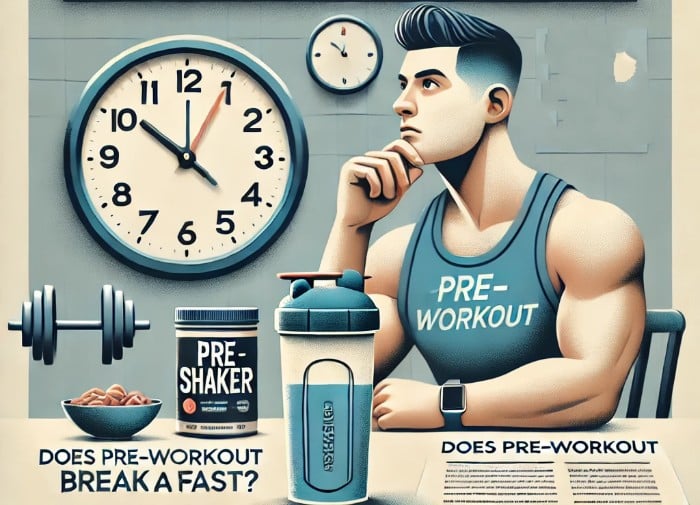
Wouldn’t it be nice if we could just say: “Pre-workouts all had X amount of calories, end of story.
Unfortunately, life is not that simple, and since there are myriad supplements out there, we cannot provide you with just one number. How many calories you get from a pre-workout supplement will depend on a few different things. One company’s suggested serving size might be one scoop of powder, while another may recommend two scoops. But more important is the stuff in the pre-workout itself — and what ratio those ingredients are in.
A sugary pre-workout supplement — whether it comes in the form of glucose, dextrose, maltodextrin, or some combination thereof — is going to end up with more calories than a supplement that doesn’t contain any sugars and/or carbs. In fact we can’t answer it as there are so many different factors like we’ve just seen that depending on the answer, the final outcome varies.
One, for example, might contain as few as 15 calories per serving; another more than 200. When fasting, every calorie counts, so before using it, read the nutritional information on the label.
Benefits Of Pre-Workouts For Fasting
We understand that pre-workout supplements are meant to fuel your energy before you workout, but if you’re fasting, depending on the type of fast you’re following, they too could have multiple benefits. Let’s look at some examples of a pre workout supplement might help you while fasting.
Better Mental Focus
If you’ve ever been without food for a few days at a time, or even just a really, really long time, you’ll have probably noticed that you started to experience brain fog and a lack of ability to concentrate. This is where a pre-workout supplement can come in super handy. Pre-workout supplements have been known to have caffeine, taurine, and other ingredients that are said to improve cognitive health and function, as well as enhance mental focus and clarity. So when you are fasting, you can focus and concentrate and think clearer for the process.
Increased Energy Levels
Undoubtedly, one of the biggest downsides of any type of fasting is the loss of energy. Your body requires food for energy and calories are the units of energy. Without them, your body just won’t have much energy. Which in turn is one of the best things about using a pre-workout supplement whilst fasted as it really does provide such a noticeable boost to our levels of energy. You’ll not only gain greater mental energy but your physical energy, too. This will allow you to get more out of your workouts and be more active while doing so.
More Effective Workouts
Yes, we know we already talked about this, but you don’t need the benefit of being more energetic to find a work out to be a good thing, so we had to add this part. Firstly, pre-workout supplements are specifically made to be used before a workout, the clue is literally in the name. If you’re fasting and still want to make sure that you get an effective workout, consider taking a pre-workout supplement before training.
Then pre-workouts helps you mentally get yourself into the “zone”, they’ll help you with strength, they’ll give you endurance, and they’ll help you explode with speed and power. From an athletic perspective, you couldn’t have asked for much more.
Fewer Hunger Pains
Believe it or not, pre-workout supplements are also useful for people struggling to get their herbal tea, in addition to hunger pains and fullness. Caffeine, for instance, has been shown to increaseearly feelings of fullness while suppressing appetite and food cravings.
As you probably know the working out when you are hungry it gives you a quality poor workout, it gives you focus on your brain and it gives you work rate. Things are different with a pre-workout supplement, though.
These help you fight off hunger pains and curb cravings before you train. It’ll mean feeling better, that you’re able to concentrate on the weights and machines when you’re working out, instead of constantly thinking about how hungry you are.
Lose More Weight
There are tons of benefits to fasting, fat loss being one of them. I admit people make their gym and their exercise for many reasons, and to lose weight is just one of them. If used in this context, a pre-workout supplement is best.
So if you want to speed up fat loss going forward, pre workout supplements while fasting are tailor-made to work for you. The difference is that pre-workouts not only energizes your body but brings fat-burning ingredients as well. The energy boost allows you to work out harder, which means you are burning more calories and losing more weight.
Following this, we’ve isolated those performance-boosting ingredients commonly seen with pre-supplements, these could be things like recuperative systems, fat-burning components like; caffeine, tea tree extract, and green espresso bean extricate would all be able to assist support digestion with the goal that you consume a more prominent measure of calories, create more vitality and encounter more prominent weight reduction in the outcome.
Fewer DOMS
Delayed onset muscle soreness, or DOMS, for short, is a perfectly normal part of working out. When we work the muscles, we damage the muscle fibers and make thousands of microtears/tears in them. Then, the body rebuilds them, redeveloping them larger and stronger than they were before. The negative side to this is, when you have finished training, you are always left with sore and stiff muscles due to the damage that you have intentionally done to them at the gym.
The great thing about using pre-workout supplement is the ingredients that help him to speed up muscle repair and recovery and help to prevent or at least reduce DOMS.
Pre-Workout Alternatives For Fasting
Right, if we assume that you’ve concluded that a pre-workout supplement is going to be off the cards for you during a fast, do you have any alternatives that can give you a shot in the arm? You know, things that provide you a physical and mental boost of energy without actually breaking a fast? Well, yes there are.
Matcha Or Green Tea
Green tea or match tea, is an excellent They are for people who do not use a pre-workout when intermittent fasting, and want an energy boost. Combined, green tea and matcha are powerhouse antioxidants maintaining cellular process and immunity.
They also have caffeine in them which is going to help you give that slight boost of energy. On top of that, both you won’t also have L-theanine, an amino acid that will improve mental concentration as well as natural energy levels.
Black Coffee
Recommendation: As we know coffee is well known as having a large amount of caffeine and it is caffeine content predominant in pre-workout supplements. Coffee prior to training will offer a sizable dose of caffeine to see you through your workout. Just be sure to drink it black, I.E. without any cream or sugars in it, or you may break your fast.
FAQ´s About Does Pre-Workout Break A Fast?
What about caffeine? Will that mess up my fast?
Good news, nope! Caffeine doesn’t have calories, so it won’t break your fast. It might even boost fat burning-while you’re fasting. A win-win if you love your morning coffee or pre-workout kick.
I’ve heard BCAAs are a no-go during fasting. Is that true?
Yep, that’s true. BCAAs (branched-chain amino acids) can trigger an insulin response, which technically breaks your fast. If you’re fasting for metabolic or fat-loss reasons, it’s best to skip them.
Can I have a pre-workout with artificial sweeteners while fasting?
Most artificial sweeteners are calorie-free and won’t break your fast. But here’s the catch, some people might experience a slight insulin response depending on how their body reacts. If you’re strict about fasting, you might want to test it out and see how you feel.
What ingredients should I avoid if I want to stay fast?
Watch out for added sugars, proteins, BCAAs, and anything with calories. Stick with pre-workouts labeled zero-calorie or fasting-friendly to stay on track.
What’s the best pre-workout option if I’m intermittent fasting?
Look for something simple: caffeine, beta-alanine, citrulline, maybe some electrolytes, all zero-calorie. These give you the energy boost without breaking your fast.
Final Thoughts:
So, does pre-workout break a fast?
Well, as you can see, the answer to that question is not quite as black and white as you may have hoped. In short, pre-workout supplements can break a fast, although to do so they would need to contain a lot of sugars, or calories from elsewhere. For the most part, however, if you aren’t being too strict when intermittent fasting, you’ll find that a pre-workout powder before training will not break your fast.
